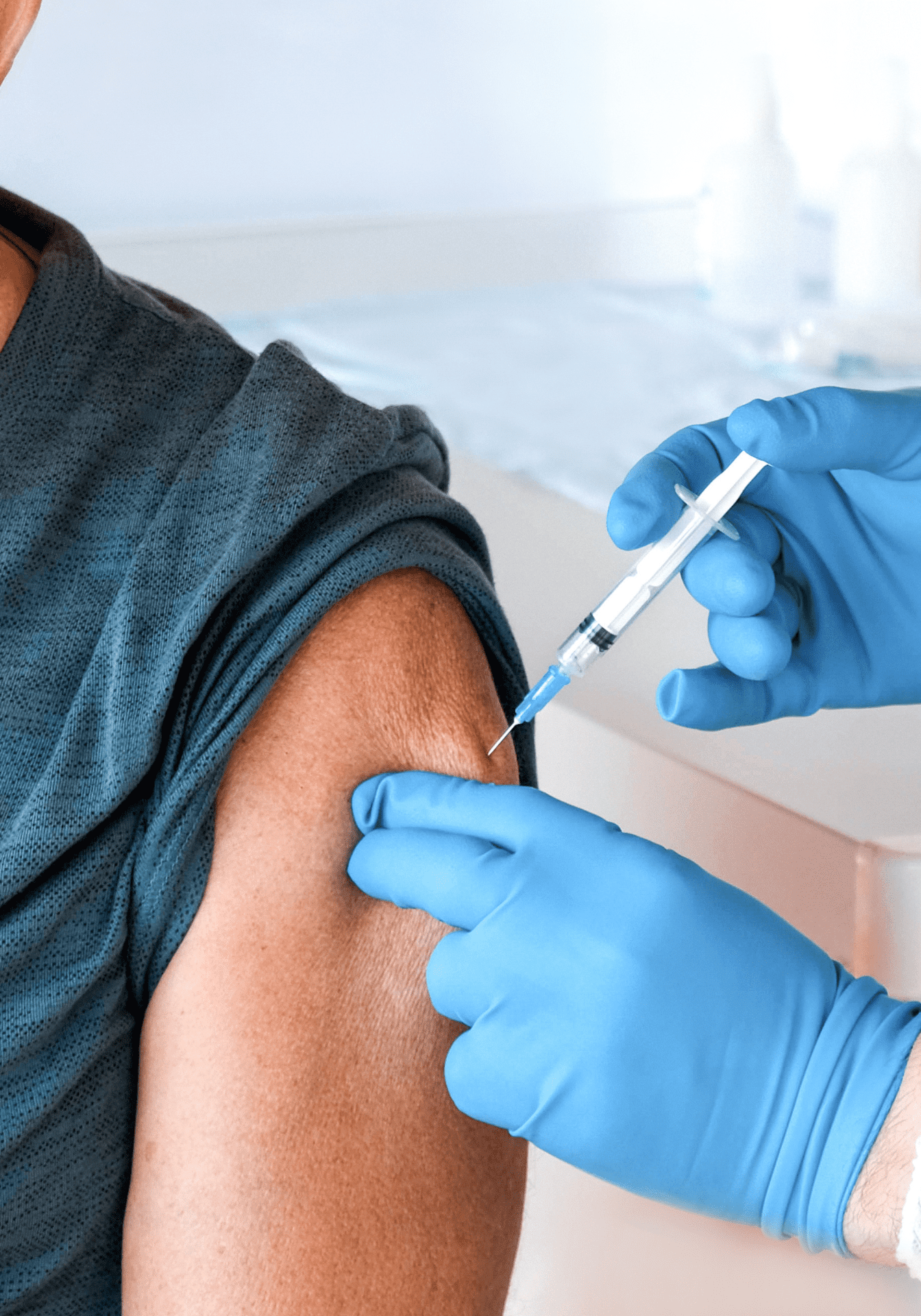Emerging Health Threats
Stay informed about emerging diseases affecting our communities in Van Buren and Cass Counties.
Predominant Diseases
Early detection and prevention are key to protecting your health and the health of your family. Below are some of the predominant diseases we monitor and are addressing in Van Buren and Cass Counties.

Latest Public Health Alerts
Stay up to date on outbreaks and health alerts in our area and across the country. Our team watches for new health risks and shares the facts you need to stay safe.
What We're Tracking Now
- Hand, Foot and Mouth Disease
See MDHHS Hand, Foot & Mouth Disease fact sheet for parents, caregivers and schools.
Read more - Mosquito & Tick Illnesses
See current info on West Nile virus, Lyme disease, and other vector-borne diseases in the MDHHS weekly Arbovirus report.
Read more - Respiratory Illnesses
Get the latest updates on COVID-19, RSV, and the flu in our region.
Read more - Food Recalls & Food Safety
Find out about recent food recalls and how to prevent foodborne illness at home.
Read more

Infectious Diseases
Influenza - Flu
Frequently Asked Questions
Can I get a COVID-19 vaccine at the same time as my flu vaccine?
- Yes! Both vaccines can be given together.
When is the best time to get a flu vaccine?
- Get Vaccinated Early: As soon as possible, ideally by the end of October.
- Peak Season: Flu typically peaks in February and can last into May.
- Antibodies: Takes about two weeks after vaccination for protection to develop.
Is the flu vaccine your best protection against the flu?
- Recommendation: Everyone aged 6 months and older needs an annual flu vaccine.
- COVID-19 Context: Widespread vaccination helps reduce flu spread and severity.
Respiratory Syncytial Virus (RSV)
Understanding Respiratory Syncytial Virus (RSV)
Respiratory Syncytial Virus (RSV) is a common respiratory virus that infects the nose, throat, and lungs. It typically causes mild, cold-like symptoms but can lead to severe illness in infants and older adults.
Who Is at Risk for Severe RSV Infection?
While RSV can affect individuals of all ages, certain groups are at higher risk for severe illness:
-
Infants, especially those under 6 months old.
-
Older adults, particularly those with chronic heart or lung diseases or weakened immune systems.
Symptoms of RSV
RSV symptoms usually appear 4 to 6 days after infection and can include:
-
Runny nose
-
Decrease in appetite
-
Coughing
-
Sneezing
-
Fever
-
Wheezing
In very young infants, the only symptoms may be irritability, decreased activity, and breathing difficulties.
How Does RSV Spread?
RSV is highly contagious and spreads through:
-
Direct contact with an infected person
-
Exposure to respiratory droplets from coughs or sneezes
-
Touching surfaces contaminated with the virus, then touching the face
Preventing RSV Infection
To reduce the risk of RSV infection:
-
Wash hands often with soap and water for at least 20 seconds.
-
Avoid close contact with sick individuals.
-
Clean and disinfect surfaces regularly.
-
Avoid touching your face with unwashed hands.
RSV Vaccination Recommendations
The Centers for Disease Control and Prevention (CDC) recommends RSV immunizations for:
-
Infants and some young children to protect against severe RSV illness.
-
Older adults, particularly those at increased risk for severe RSV disease.
Consult with your healthcare provider to determine if RSV vaccination is appropriate for you or your child.
When to Seek Medical Attention
Seek immediate medical care if you or your child experience:
-
Trouble breathing
-
Dehydration (e.g., lack of urine output)
-
Worsening symptoms or symptoms that do not improve after a few days
Early medical intervention can prevent complications, especially in high-risk groups.
For more detailed information, visit the CDC's RSV page.
COVID-19
Get the Latest COVID-19 Vaccine (2025–2026)
The new COVID-19 vaccine is now available at VBCDHD.
Free COVID-19 Test Kits and Masks
Pick up free at-home COVID-19 test kits and masks at both office locations.
Schedule Your COVID-19 Vaccine Appointment
Call (269) 740-4155 to schedule your vaccine appointment today.
Clinic Locations and Hours
Lawrence Clinic
260 South St., Lawrence, MI 49064
Open Thursdays:
- 9:00 AM to 11:00 AM
- 1:00 PM to 4:00 PM
Dowagiac Clinic
302 South Front St., Dowagiac, MI 49047
Open the first and third Wednesdays:
- 9:00 AM to 11:00 AM
- 1:00 PM to 4:00 PM
Essential COVID-19 Resources
- CDC Covid Data Tracker
- General Information: Michigan.gov/Coronavirus | CDC.gov/Coronavirus
- MDHHS update (May 11, 2023): The federal Public Health Emergency has ended.
- For current data on respiratory illnesses in Michigan—including COVID-19, influenza, and RSV —visit Michigan.gov/COVIDFLURSV.
Norovirus
Measles
Measles: What You Need to Know
Measles is a highly contagious viral infection that can cause serious complications, especially in young children, adults over 20, pregnant women, and people with weakened immune systems.
Key Points:
-
Transmission: Spread through coughs and sneezes; the virus can linger in the air for up to two hours.
-
Symptoms: High fever, cough, runny nose, red eyes, and a red rash that spreads from the head downward.
-
Complications: Pneumonia, brain swelling, and long-term immune suppression.
-
Prevention: The MMR vaccine is the safest and most effective protection. Children should get two doses (12–15 months and 4–6 years), and adults without immunity may also need vaccination.
Learn More: MDHHS Measles Information
West Nile Virus
What is West Nile Virus?
West Nile virus (WNV) is a disease spread to humans through the bite of an infected mosquito. Most people infected have no symptoms, but some may develop mild illness or, in rare cases, serious complications such as meningitis or encephalitis. Older adults and those with weakened immune systems are at higher risk for severe illness.
Key Facts:
-
Spread through mosquito bites, not person-to-person.
-
Many have no symptoms; some experience fever, headache, muscle aches, or fatigue.
-
Severe cases can cause neurological illness and require medical attention.
-
Risk is highest in late summer and early fall.
-
Prevention is the best protection—avoid mosquito bites and reduce breeding areas.
Learn More:
H5 Bird Flu
Current Bird Flu Situation in Van Buren and Cass County, Michigan
Avian influenza (bird flu) continues to pose a threat to both wild and domestic birds. While the risk to humans remains low, cases have been reported in surrounding areas. Local poultry producers should remain vigilant and monitor for any signs of the virus.
If you suspect a bird flu outbreak, please contact our team at Van Buren/Cass District Health Department for guidance and support.
For the latest updates and resources on bird flu, visit the CDC Bird Flu Situation Summary.
Mpox (Monkeypox)
Mpox (Monkeypox/MPV): What You Need to Know
Mpox, also called monkeypox or MPV, is a rare viral illness. It spreads through close contact with bodily fluids, mpox rashes, or lesions.
Who Is at Risk?
The risk of mpox is low for most people. Anyone can get mpox through close contact with an infected person, but recent U.S. cases are mainly among young men who have sex with men.
If exposed or if you have symptoms, contact a healthcare provider right away.
How Does Mpox Spread?
Mpox spreads through:
- Direct contact with rashes, sores, or bodily fluids.
- Intimate contact, including sex, hugging, or prolonged face-to-face contact.
- Shared items like clothing or bedding (low risk).
Mpox is not as contagious as COVID-19 and doesn’t spread through casual contact.
Symptoms of Mpox
Mpox symptoms appear 3–17 days after exposure and include:
- Flu-like symptoms: fever, headache, swollen lymph nodes, and exhaustion.
- A rash or sores, often near the genitals or anus, but also on the hands, feet, or face.
The illness lasts 2–4 weeks. Mpox is contagious until all sores heal, scabs fall off, and new skin forms.
Is Mpox Serious?
Most cases resolve without treatment. However, severe illness can occur in:
- Young children.
- Pregnant individuals.
- People with weakened immune systems or eczema.
Testing for Mpox
To test for mpox, a healthcare provider swabs the sores and sends the sample to a lab.
Treatment and Vaccines
- Treatment: No specific cure, but antiviral medication may help. Most people recover in 2–4 weeks.
- Vaccines: Vaccines can prevent mpox. If given within 4 days of exposure, vaccines may stop illness.
What to Do if Exposed or Diagnosed
- Avoid close contact with others, including pets.
- Contact a healthcare provider or your local health department.
For guidance, see:
Rabies
Animal Bites & Rabies: Protect Yourself and Your Pets
Rabies is a serious threat in Michigan, especially during warmer months. Learn how to stay safe, protect your pets, and what to do if bitten.
Prevent Rabies: Key Tips
- Avoid Wildlife: Bats, raccoons, skunks, and foxes are common rabies carriers. Avoid contact and teach children to steer clear.
- Vaccinate Your Pets: Ensure pets are up to date on rabies vaccinations to protect them and reduce your exposure risk.
- Stay Informed: Learn about rabies and Michigan wildlife activity.
Learn More About Rabies | Michigan’s Bats Information
Report Animal Bites
Animal bites must be reported immediately to prevent rabies.
- Download the Animal Bite Reporting Form here.
- Fax Completed Forms:
- Van Buren County Public Health Nursing: (269) 621-2725
- Van Buren County Animal Control: (269) 657-7207
- Cass County Public Health Nursing: (269) 782-0121
- Cass County Animal Control: (269) 445-5018
Report Sick or Dead Wildlife
Help protect Michigan’s wildlife and prevent disease spread.
- Call Michigan DNR: (517) 336-5030
- Report Online: Eyes in the Field Website
Rabies Exposure Protocols
Understand what to do if exposed to rabies.
- Human Rabies PEP: Details Here
- Animal Rabies Protocols: Details Here
- Vaccine Information Sheets:
Contact Us
- Van Buren County: (269) 621-3143
- Cass County: (269) 782-0064
Additional Resources
- Michigan Rabies Information
- CDC Rabies Information
- Rabies Status by Country: A global assessment tool for travelers and pet importers.
Contact Our Team
For information, assistance, or to report a serious disease or unusual cluster, reach out to:
Diana Baker, RN
Public Health Nurse, Cass County
Phone: (269) 782-0064 ext. 2015
Julie Beeching, RN, BSN
Director of Nursing, Van Buren County
Phone: (269) 539-5501

